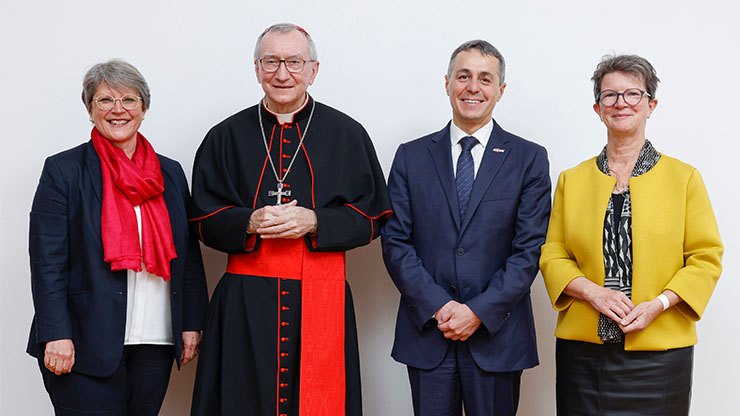Diplomatic relations between Switzerland and the Holy See were resumed in 1920, putting an end to the so-called Kulturkampf. To celebrate this anniversary, Cardinal Secretary of State Pietro Parolin is visiting Switzerland for several days and will meet with the Federal Council and church leaders. In the spirit of ecumenism and diplomacy, the Curia cardinal together with Federal Councilor Ignazio Cassis attended the Synod of the Protestant Church in Switzerland in Bern today.
In his greeting to the highest body of the Reformed churches, Pietro Cardinal Parolin expressed his desire to restore Christian unity: ‘Walking, Praying and Working together are three key words of the ecumenical movement. Other confessions are also invited to the synodal path of the Catholic Church’. He then thanked the President of the PCS, Rita Famos, for her offer of support. He reminded the members of the Synod to always keep their eyes on peace, adding that this meeting showed that diplomatic and ecumenical work pursue the same goal: to allow people to live together in peace.
In his greeting to the members of the Synod and the guests, Federal Councilor Ignazio Cassis focused on the dialogue that is being lived in Swiss ecumenism: ‘This willingness to listen to each another, this willingness for living diversity is the foundation of every relationship! And it is an essential characteristic of Switzerland.’ He expressed his wish that the members of the Synod might continue to be inspired by a dedication to peace based on dialogue.
The PCS took this opportunity to draw Foreign Minister Cassis’ attention to the parliamentary culture, which characterizes the churches recognized under public law, a competence which the Confederation is happy to place at the Catholic Church’s disposal in the search for synodal processes. President Rita Famos underscored what unites the Christian denominations above and beyond their foundation in faith: the commitment to peace and the observance of human rights. She addressed Federal Councilor Cassis with a request: ‘Be creative in finding new ways of cultivating relationships between the state, churches and religious communities, for example in a formalized exchange between them and the Federal Council.’ She emphasized that the other Christian confessions, through their work in the World Council of Churches and their aid agencies, also have potential that the Federal Council should utilize for its mission of peace.
Milan Kostrešević, President of the Working Group of Christian Churches in Switzerland (AGCK.CH), thanked the Federal Council for taking into account the special situation of the churches during the coronavirus pandemic. ‘In Switzerland we can look back on a long history of good and fruitful cooperation between church actors and politics in the individual cantons,’ said Kostrešević, who in his vote advocated the cultivation of stronger ecumenical relationships.
The inter-confessional encounter took place in the presence of numerous guests from the Swiss ecumenical movement. The Synod in Bern’s City Hall welcomed Bishop Harald Rein of the Christian Catholic Church of Switzerland, Renata Asal-Steger, President of the Roman Catholic Central Conference, Daniel Kosch, its General Secretary, Bishop Felix Gmür, President of the Swiss Bishops’ Conference, Abbot Urban Federer, Officer for Ecumenical Dialogue, and Erwin Tanner, General Secretary of the SBC.
At the end of the event, President Rita Famos presented Cardinal Parolin with a sustainable gift: as a sign of the growth in good relations, the aid organization of the Protestant Church in Switzerland, HEKS, will plant 300 moringa trees, which will serve as a source of income and food for smallholder families. Moreover, Rita Famos presented Federal Councilor Cassis with a donation certificate for an HEKS project which supports young people in Switzerland in starting their careers. The HEKS is celebrating its 75th anniversary this year. During the Synod, a photo exhibition on the impressive history of the church aid organization can be visited at City Hall.
